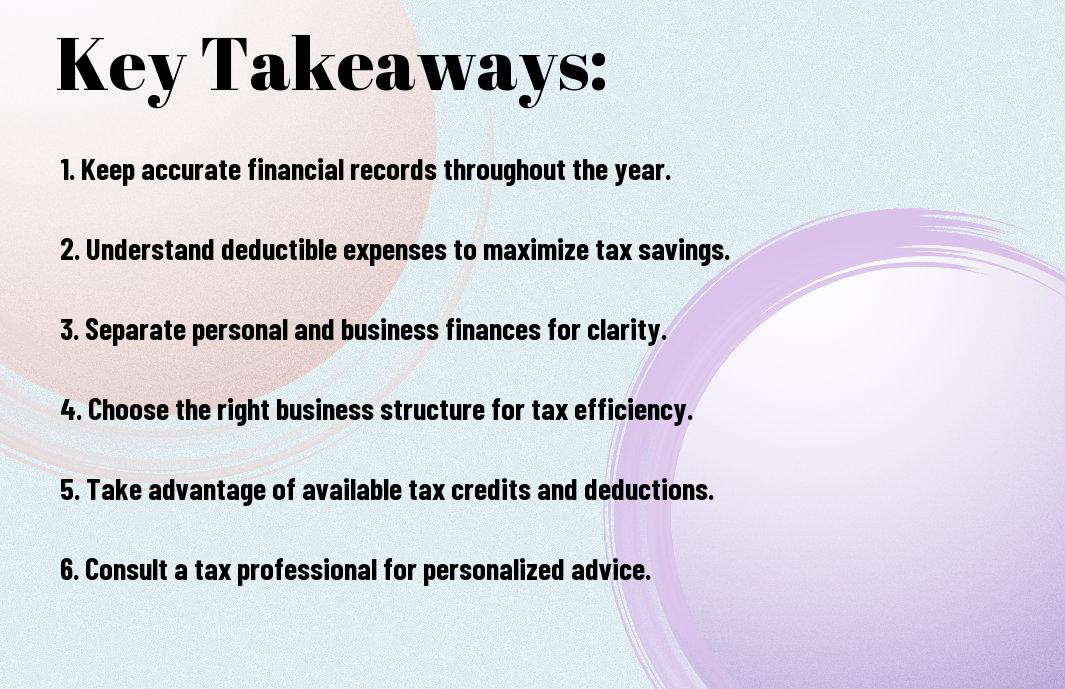Most small business owners find navigating taxes to be a daunting task, but understanding the crucials can save you both time and money. In this blog post, we will provide you with key tax tips that will help you stay organized, maximize deductions, and ensure compliance with tax regulations. By applying these strategies, you can make informed decisions that benefit your business and could lead to significant savings. Let’s investigate these valuable insights that every small business owner should know.

Key Takeaways:
- Keep Accurate Records: Maintain organized financial records to simplify tax preparation and ensure compliance.
- Understand Deductions: Familiarize yourself with eligible deductions that can reduce your taxable income, such as business expenses and home office costs.
- Estimated Taxes: Pay estimated taxes quarterly to avoid penalties and interest for underpayment when filing your annual return.
- Utilize Tax Software: Invest in reliable tax software to streamline the filing process and minimize errors.
- Consult a Professional: Engage a tax professional for personalized advice, especially if your business structure or income changes significantly.

Understanding Small Business Taxes
Your journey into small business taxes begins with a clear understanding of what you owe and when. Familiarizing yourself with tax obligations helps you maintain compliance and possibly save money. Explore 17 Big Tax Deductions (Write Offs) for Businesses that can ease your financial burden.
Types of Taxes for Small Businesses
By knowing the different types of taxes applicable to your business, you can better manage your financial planning. Here are the key taxes you may encounter:
- Income Tax
- Self-Employment Tax
- Payroll Taxes
- Sales Tax
- Property Tax
After understanding these taxes, effective planning becomes seamless.
| Type of Tax | Details |
| Income Tax | Tax on your business’s net income. |
| Self-Employment Tax | Social Security and Medicare taxes for self-employed individuals. |
| Payroll Taxes | Taxes withheld from employees’ wages. |
| Sales Tax | Tax applied to the sale of goods and services. |
| Property Tax | Tax based on the value of owned property. |
Important Tax Deadlines
On navigating through your small business tax responsibilities, adhering to important deadlines is key to avoiding penalties. Key dates for filing your taxes and making requisite payments must be marked on your calendar.
The deadlines typically involve your federal income tax return, estimated tax payments, and payroll tax filings. Knowing these dates enables you to prepare in advance and ensures that your submissions are timely, preventing unnecessary stress and fees.
Deductions and Credits
One of the most effective ways to reduce your taxable income as a small business owner is by utilizing deductions and credits. These financial tools can significantly lower your tax liability, allowing you to reinvest savings back into your business. Being aware of the eligible deductions and credits can help you optimize your tax strategy, ensuring you maximize the benefits available to you.
Common Tax Deductions for Small Businesses
With careful record-keeping, you can take advantage of various tax deductions available to small businesses. Common deductions include business expenses like office supplies, travel, and utilities, as well as costs related to software, advertising, and employee wages. By tracking and categorizing these expenses throughout the year, you can reduce your overall taxable income, ultimately improving your bottom line.
Tax Credits Available for Small Business Owners
Small business owners can benefit from several tax credits designed to incentivize investment and spur growth. These credits may include those for research and development, hiring employees from targeted groups, and offering health coverage, among others.
Another important area to explore is the qualified business income (QBI) deduction, which allows you to deduct up to 20% of your qualified business income. Additionally, consider tax credits for providing workforce training or utilizing renewable energy sources. By leveraging these credits, you can further enhance your savings and support the ongoing development of your business.
Record Keeping Best Practices
Keep your financial records organized and up to date to streamline your tax preparation and ensure compliance with regulations. Effective record-keeping allows you to track expenses, monitor cash flow, and make informed business decisions. This practice not only simplifies tax filing but also provides a solid foundation for your company’s financial health.
Importance of Accurate Record Keeping
Against the backdrop of potential audits and financial uncertainties, maintaining accurate records provides you with a clear picture of your business’s performance. Accurate record keeping protects your interests, helps you take advantage of deductions, and reduces the likelihood of costly errors during tax season.
Tools for Organizing Financial Records
Record keeping is made easier with the use of various tools designed to help you manage financial documents efficiently. From accounting software to spreadsheets and cloud storage, these tools can assist you in tracking income, expenses, and pertinent tax documents while ensuring that everything is accessible when you need it.
Considering your unique business needs, there are several tools available for organizing your financial records. Accounting software like QuickBooks or FreshBooks offers comprehensive solutions for invoicing, expense tracking, and financial reporting. Alternatively, using cloud storage platforms, such as Google Drive or Dropbox, allows you to save and share documents securely. Implementing these tools not only streamlines your record-keeping process but also enhances your overall productivity, enabling you to focus on growing your business.
Hiring a Tax Professional
Not every small business owner has the expertise or time to navigate the complexities of tax regulations. Engaging a tax professional can provide you with the guidance needed to optimize your tax situation and ensure compliance, leaving you to focus on growing your business.
When to Consider Professional Help
Among the signs that it may be time to seek professional assistance include a lack of familiarity with tax laws, experiencing a significant life event, or noticing your tax situation has become more complicated. If you find yourself overwhelmed or unsure, a tax advisor can bring clarity and peace of mind.
Advantages of Utilizing Tax Advisors
Consider the benefits of hiring a tax advisor, including personalized tax strategies, efficient tax preparation, and access to their knowledge of constantly changing tax laws. They can help you maximize deductions and credits you may not be aware of, ultimately saving you money.
Help from a tax advisor can significantly streamline your financial processes. They possess the expertise to identify potential tax savings and can provide tailored advice based on your specific business needs. Additionally, having a tax professional manage your filings minimizes the risk of errors that could lead to penalties, allowing you to invest more energy in your business operations.
Tax Planning Strategies
All small business owners should prioritize effective tax planning strategies to minimize liabilities and maximize savings. Understanding tax regulations and leveraging credits and deductions can significantly enhance your financial position. By implementing thoughtful strategies year-round, you will be better prepared to face tax-related challenges and ensure compliance while optimizing your tax situation. This proactive approach allows you to take control and potentially reduce what you owe at tax time.
Proactive vs. Reactive Tax Planning
Below are the key distinctions between proactive and reactive tax planning. Proactive tax planning means taking preventive steps throughout the year to anticipate tax liabilities, whereas reactive planning often involves scrambling at the last minute to address tax issues. Adopting a proactive approach allows you to have a clear strategy in place and potentially save more.
Year-End Tax Planning Tips
Planning for year-end tax strategies is necessary for maximizing your savings. Here are some tips to consider as the year wraps up:
- Review your financial statements to identify areas for deductions.
- Consider deferring income to the next tax year if you’re in a higher tax bracket.
- Make contributions to retirement accounts to reduce taxable income.
- Evaluate whether to purchase any business-related assets before year-end.
Thou can effectively manage your tax obligations and financial health by planning ahead.
Proactive planning goes beyond just year-end strategies; it involves assessing your financial situation regularly throughout the year. Here are additional year-end tips to maximize your tax efficiency:
- Document business expenses meticulously to ensure you capture every deduction.
- Consult with a tax professional for tailored advice that suits your unique situation.
- Consider charitable contributions to receive potential tax benefits.
- Prepare for potential tax law changes expected in the upcoming year.
Thou will position yourself for success by prioritizing proactive tax planning.
Common Mistakes to Avoid
Once again, small business owners must stay vigilant to avoid common tax pitfalls. Missteps like misclassifying employees or overlooking tax obligations can lead to costly penalties and audits. For more information on navigating your fiscal responsibilities, check out Tax Tips and Strategies for Small Business Owners.
Misclassifying Employees and Contractors
On the surface, it may seem straightforward to categorize your workforce, but misclassifying employees as independent contractors can result in significant tax liabilities. This mistake can lead to unexpected back taxes, penalties, and interest, complicating your financial situation tremendously.
Ignoring Tax Obligations
Among the most detrimental errors is ignoring your tax obligations. Staying informed on filing deadlines, payrolls, and self-employment taxes is crucial to maintaining your business’s financial health. The repercussions of ignoring these responsibilities can be severe, including hefty fines and potentially, legal action.
Misclassifying your team members can not only lead to unexpected tax bills but can also affect your business’s reputation. Proper classification ensures that you comply with labor laws and avoid expensive audits. You must stay updated on IRS guidelines and monitor your payroll practices closely to ensure accurate reporting.
Summing up
Hence, as a small business owner, implementing effective tax strategies can significantly impact your financial health. By keeping meticulous records, maximizing deductions, and understanding available credits, you can optimize your tax obligations. Staying informed about tax laws and seeking professional guidance when necessary will empower you to make informed decisions. By applying these top tax tips, you can better navigate the complexities of taxation, ultimately allowing you to focus on growing your business and achieving your goals.
Top Tax Tips for Small Business Owners
Q: What are some common tax deductions that small business owners can take advantage of?
A: Small business owners can benefit from a variety of tax deductions that can help lower their taxable income. Some of the most common deductions include expenses related to business operations, such as rent or lease payments, utilities, office supplies, and employee wages. Additionally, costs associated with travel, meals, and entertainment for business purposes may also qualify for deductions. It’s important to maintain detailed records of all expenses and consult with a tax professional to ensure that deductions are maximized and comply with IRS regulations.
Q: How can small business owners accurately track their business expenses?
A: Accurate tracking of business expenses is fundamental for effective tax management. Small business owners can use accounting software to streamline this process, as it allows for easy categorization and reporting of expenses. Keeping digital receipts and maintaining a separate bank account for business transactions can also enhance tracking accuracy. Regularly reviewing financial statements and categorizing expenses monthly helps ensure that all possible deductions are accounted for during tax preparation.
Q: What are the tax implications of hiring independent contractors versus employees?
A: When small business owners decide between hiring independent contractors and employees, they should understand the different tax implications associated with each. Independent contractors typically handle their own taxes, meaning businesses do not withhold income tax or pay payroll taxes on their behalf. Conversely, employers are responsible for withholding taxes for employees and covering half of their Social Security and Medicare taxes. This distinction can affect overall labor costs and tax liabilities, so it’s wise for business owners to evaluate their staffing needs and consider consulting a tax professional for guidance on compliance and strategic decisions.
